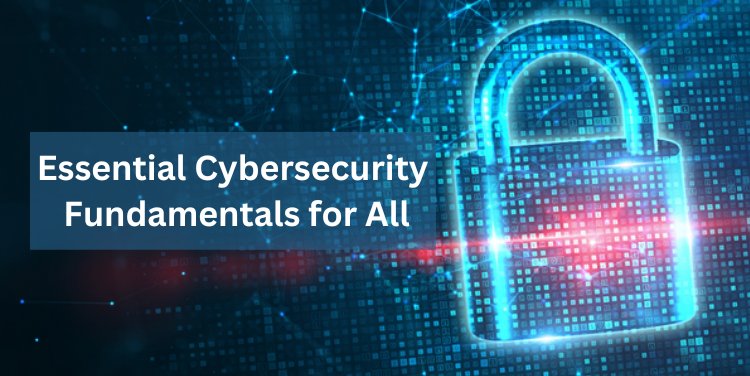Essential Cybersecurity Fundamentals for All

In an era dominated by digital connectivity, the significance of cybersecurity cannot be overstated. Whether you're an avid internet user or a seasoned professional, understanding the basics of cybersecurity is essential for safeguarding personal and organizational digital assets. In this blog post, we will delve into fundamental cybersecurity principles that apply to everyone, irrespective of their level of tech-savviness.
1. Password Mastery: A robust defense begins with mastering the art of passwords. Craft strong, unique passwords for each account, and where possible, bolster security with multi-factor authentication. Regularly update passwords to thwart potential unauthorized access attempts.
2. Phishing Defense: Phishing attacks are prevalent, and recognizing their tactics is crucial. Learn to identify suspicious emails, especially those with unfamiliar links or unexpected attachments. Report phishing attempts promptly to prevent potential security breaches.
3. Regular Software Vigilance: Outdated software is akin to an open invitation for cyber threats. Stay proactive by ensuring that your operating systems and applications are regularly updated. Enable automatic updates whenever possible to stay shielded with the latest security patches.
4. Vigilant Internet Practices: Safe internet practices are your first line of defense. Stick to reputable websites, steer clear of dubious downloads, and resist clicking on pop-up ads. Familiarize yourself with the risks associated with insecure websites to bolster your online security.
5. Guardian of Data: Whether it's personal or professional data, treat it like a prized possession. Understand the significance of data protection, adhere to data classification protocols, and follow secure practices for storing and sharing sensitive information.
6. Device Sentry: In an era of mobile dominance, securing your devices is non-negotiable. Employ device passwords, activate encryption features, and report lost or stolen devices promptly. Your diligence can prevent unauthorized access to valuable information.
7. Defending Against Social Engineering: Beware of manipulative tactics employed by cybercriminals through social engineering. Exercise caution when divulging sensitive information and verify the identity of the requester, especially in phone or in-person interactions.
8. Wi-Fi Vigilance: Public Wi-Fi networks are breeding grounds for security threats. Exercise caution when connecting to public Wi-Fi, and consider using Virtual Private Networks (VPNs) for secure connections, especially when accessing sensitive information remotely.
9. Incident Reporting Protocols: Create a culture where reporting security incidents is encouraged and stress-free. Establish clear procedures for reporting suspicious activities or potential breaches. A swift response is key to mitigating cybersecurity threats effectively.
Cybersecurity is a shared responsibility that transcends technical expertise. By embracing these essential cybersecurity fundamentals, individuals contribute to the collective resilience against evolving digital threats. Regardless of your role or familiarity with technology, a commitment to cybersecurity basics fortifies the digital defenses for individuals and organizations alike. Stay informed, stay vigilant, and stay secure in our interconnected digital landscape.
What's Your Reaction?















